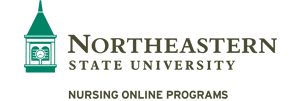When it comes to employment opportunities, the nursing profession stands out. Looking at employment projections to 2024, there will be more new jobs for registered nurses (RNs) than for any other occupation.
Why are tens of thousands of qualified applicants being turned away from nursing schools? A shortage of nurse educators is one of the main reasons. Considering the current nurse faculty shortage and the growing demand for nurses, now is the time to consider a nursing education career.
A Master of Science in Nursing (MSN) in Nursing Education prepares RNs to become nurse educators at the advanced practice level. Online programs such as the MSN in Nursing Education at Northeastern State University (NSU) make it possible for RNs to gain the credentials to teach in as few as 12 months.
The Need for Nurse Educators
As the need for RNs continues to grow, so does the need for nursing faculty to educate them. According to the American Association of Colleges of Nursing (AACN), nursing schools in the U.S. rejected nearly 65,000 qualified applicants in 2016-2017.
Data reported by the AACN shows that nurse faculty retirements might worsen the shortage:
- Average age for nurse faculty with a doctorate: 62.2 years (professors); 57.6 years (associate professors); 51.1 years (assistant professors)
- Average age for nurse faculty with a master’s: 57.8 years (professors); 56.6 years (associate professors); 50.9 years (assistant professors)
- Average age of nurse educators at retirement: 62.5 years
Based on a National Nursing Workforce Survey, only 14 percent of full-time nurse faculty are under age 40. Currently, there are not enough younger nurse educators to replace those who are retiring. While nurses are being called on to take a leading role in transforming healthcare, nursing schools lack the capacity to meet the demand.
How Can RNs Prepare for a Career in Nursing Education?
Nursing education lays the groundwork for high-quality patient care. And, it takes more than clinical expertise to be an excellent nurse educator. Effective teaching requires knowing how to facilitate learning.
NSU’s MSN in Nursing Education is aligned with core competencies set by the National League for Nursing. Coursework emphasizes:
- Curriculum planning and design
- Learning environments that promote student learning and achievement
- Technology and informatics applications that support learning
- Assessment, measurement and evaluation
- Nurse educator role, including factors that influence that role (such as political, social and institutional)
The value of mentoring at all levels of nursing cannot be overstated. In support of this, NSU’s Nursing Education program includes an embedded practicum that pairs students with mentors.
Why Consider a Career in Nursing Education?
Given the current and future demand for nurses, nurse educators can make a significant contribution to healthcare. Additional reasons to consider nursing education include:
Higher Salaries: According to Salary.com as of December 28, 2018, nurse faculty salaries in the U.S. typically range from $74,8352 to $136,332 per year.
More Job Options: Nurse faculty work in undergraduate and graduate nursing programs. Some balance nursing practice with teaching. Nurse educators also work as clinical instructors, supervising students in clinical placements. Community health organizations, continuing education programs and professional associations are other employment options.
Flexibility: Nurse educators are not necessarily tied to typical work hours. In university settings, for example, faculty can plan around the academic calendar and class schedules. Teaching online courses may offer additional flexibility and convenience.
Professional Development: Earning an MSN puts RNs one step closer to a doctorate. A Doctor of Nursing Practice (DNP) compares with other health profession doctorates, such as a Doctor of Medicine (MD) and Doctor of Pharmacy (PharmD). A Doctor of Philosophy (PhD) in nursing focuses more on research.
Empowered Students: An article on DailyNurse highlights the influence of nurse educators: “What student nurses learn and what they experience, either positive or negative, during their formation as a nurse will forever become part of their character.” The bullying that some nursing students experience runs counter to the compassionate care that the profession is known for. Educators have the power to create an environment of mutual support and respect that students can carry with them into their careers.
In 2005, the American Organization of Nurse Executives recommended that all RNs be educated at the bachelor level. The Institute of Medicine (now the National Academy of Medicine) followed with a call for 80 percent of RNs to have a BSN by 2020. These efforts reflect research linking higher levels of nursing education to improved patient care.
In response, hospitals increasingly require or prefer RNs to have a BSN. Hospitals are by far the largest employer of RNs, underscoring the need to address the nursing faculty shortage. For RNs who are already practicing, there is no time like the present to pursue an MSN in Nursing Education.
Learn more about NSU’s online MSN in Nursing Education program.
Sources:
U.S. Bureau of Labor Statistics: Monthly Labor Review: Occupational Employment Projections to 2024
AACN: Nursing Faculty Shortage
Robert Wood Johnson Foundation: Wanted: Young Nurse Faculty
National League for Nursing: Nurse Educator Core Competency
Salary.com: Professor – Nursing in the United States
DailyNurse: Bullying of the Student Nurse: The Cycle Begins
AACN: The Impact of Education on Nursing Practice
NCBI: The Future of Nursing: Leading Change, Advancing Health


